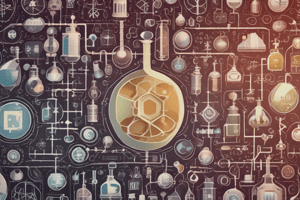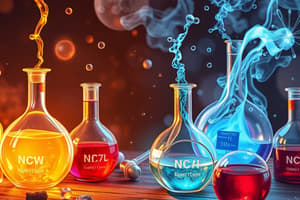Podcast
Questions and Answers
What is the main focus of chemistry?
What is the main focus of chemistry?
Studying the properties, structure, and behavior of matter.
How many chemical elements approximately make up all matter?
How many chemical elements approximately make up all matter?
Approximately 100 chemical elements.
Define a chemical according to chemists.
Define a chemical according to chemists.
A type of matter that has mass and takes up space.
Why is knowledge of chemistry essential?
Why is knowledge of chemistry essential?
What does chemistry seek to identify and define?
What does chemistry seek to identify and define?
What does chemistry investigate at its core?
What does chemistry investigate at its core?
Explain how the complexity of our world arises from the combination of basic elements.
Explain how the complexity of our world arises from the combination of basic elements.
Compare and contrast the familiarity of common elements like hydrogen and chlorine with less familiar elements like selenium and rubidium.
Compare and contrast the familiarity of common elements like hydrogen and chlorine with less familiar elements like selenium and rubidium.
Explain how the combination of sodium and chlorine, two notorious chemicals, results in the formation of the seemingly innocuous compound table salt.
Explain how the combination of sodium and chlorine, two notorious chemicals, results in the formation of the seemingly innocuous compound table salt.
Discuss the role of chemistry beyond just laboratories and test tubes, and how it is integral to everyday life.
Discuss the role of chemistry beyond just laboratories and test tubes, and how it is integral to everyday life.
Explain how understanding the basic principles behind chemical reactions and interactions can help us gain insight into the world around us and harness the power of these processes for technological advancements and sustainable solutions.
Explain how understanding the basic principles behind chemical reactions and interactions can help us gain insight into the world around us and harness the power of these processes for technological advancements and sustainable solutions.
Flashcards are hidden until you start studying
Study Notes
Chemistry: Understanding the Building Blocks of Our Universe
Chemistry is the scientific discipline that studies the properties, structure, and behavior of matter. This field is fundamental to understanding our universe, as all matter, whether organic or inorganic, is composed of some combination of approximately 100 chemical elements. These elements, which range from well-known ones like oxygen and calcium to lesser-known ones like europium and francium, combine to form countless compounds that make up the world around us.
The Basics of Matter
At its core, chemistry investigates the composition, properties, and transformations of matter. It seeks to identify and define the specific elements and simple substances that make up complex materials. Knowledge of chemistry is essential because everything we encounter, from the air we breathe to the food we consume, involves chemical reactions and interactions.
What Are Chemicals?
Often thought of as substances found exclusively in laboratories or non-natural sources, chemists actually view everything as being composed of chemicals. A chemical is simply a type of matter that has mass and takes up space. This includes both naturally occurring substances, like water or sugar, as well as artificially created ones, like pharmaceuticals or engineered polymers.
Familiarity with the Elements
While there are countless types of matter compositions possible, the complexity of our world arises from various combinations of these basic elements. Some common elements like hydrogen and chlorine have well-known properties and uses, while others like selenium and rubidium may be less familiar to the general public. Despite this range, all matter can ultimately be traced back to these fundamental building blocks.
Element Interactions: Creating New Compounds
The magic of chemistry lies in its ability to create new substances through the combination of basic elements. For example, combining two notorious chemicals—sodium and chlorine—results in a seemingly innocuous compound: table salt. Understanding the basic properties of elements and how they react when combined with one another allows chemists to predict and explain the formation of new substances.
The Role of Chemistry Beyond Laboratories
Chemistry extends beyond test tubes and lab coats; it is integral to everyday life. It helps us understand how objects interact, why some materials stick together while others don't, and even what happens when we taste food. In addition, chemistry plays a significant role in industries ranging from pharmaceuticals to environmental sustainability, demonstrating the far-reaching implications of this discipline.
In conclusion, chemistry is the cornerstone of science that explores matter and its transformations. By understanding the basic principles behind chemical reactions and interactions, we can gain insight into the world around us and harness the power of these processes for technological advancements and sustainable solutions.
Studying That Suits You
Use AI to generate personalized quizzes and flashcards to suit your learning preferences.




